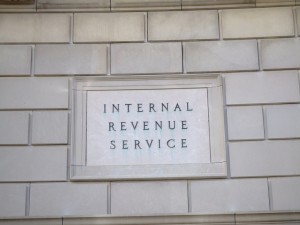The myriad challenges awaiting MA’s frontier entrepreneurs aiming to open up medical marijuana dispensaries in light of the recent passing of the final regulations have been documented at length. There’s the perpetually looming threat of a federal raid, which can leave lawful business owners facing criminal charges and financial calamity. The uncertainty of local zoning restrictions puts into doubt exactly what kind of physical limitations the dispensaries will have to deal with, and whether they can realistically operate under such parameters.
When calculating potential forces of obstruction, future dispensary owners would be ill-advised to ignore that other elephant in the room: the Internal Revenue Service.
One would think that an agency committed to ensuring a streamline source of revenue for the federal government would throw up its arms in an open embrace of an industry that has the potential to generate hundreds of millions in tax dollars. Judging from the short but frenetic history of tax regulation of medical marijuana, one would be wrong. Rather than working to effect clear measures by which to collect that revenue, the I.R.S. has instead chosen to use an obscure code – aimed at shutting down illegal operations – to put the hammer on fully lawful medical marijuana business practices.
 Section 280E was initiated in the early 1980s. At the time, Ronald (and Nancy) Reagan’s unfolding war on drugs was still in the stage of targeting large scale Cocaine kingpins at home and abroad. Dealing with the former, 280E prohibited any individuals involved with the illicit sale of controlled substances from claiming standard business expenses on their federal taxes. The measure would directly impact a criminal’s ability to profit off said criminal behavior.
Section 280E was initiated in the early 1980s. At the time, Ronald (and Nancy) Reagan’s unfolding war on drugs was still in the stage of targeting large scale Cocaine kingpins at home and abroad. Dealing with the former, 280E prohibited any individuals involved with the illicit sale of controlled substances from claiming standard business expenses on their federal taxes. The measure would directly impact a criminal’s ability to profit off said criminal behavior.
Fast forward thirty years. Thanks to the democratic process – involving a statewide vote, administrative rulemaking, and public comment – medical marijuana is legal in Massachusetts. Yet, while 280E was designed with the intent to filter out illegal activity, the wording of the bill is not as explicit, instead relying on the “controlled substances” language. Now, the I.R.S. is using the technicality of the language to amp up its drive against state-licensed dispensaries before they even open their doors.
The irony is that putting such a financial strain on legal merchants of the marijuana trade, the I.R.S. is actually ensuring more illegal, black market drug trafficking. When the choice becomes to report your expenses, but to get no tax savings from them, or to not even incorporate them into the revenue scheme and keep every penny (and also not be on the Treasury’s radar), it would take an impenetrable ethical wall to even consider both options. It is widely known that initial operating expenses for medical marijuana dispensaries can be quite high, only to be offset by the eventual boon in revenue once the shop is up and running.
Of course, the I.R.S. is not entirely insular. Their enforcement of 280E is part of a larger federal strategy on medical marijuana which, thanks to rapid developments in legalization nationwide, may be shifting in the near future. Until then, dispensary owners aren’t catching any breaks, and the only way to stay ahead in your brave journey towards uncharted MA territory is to retain the advice of an attorney well versed on the ins and outs of this intricate and ever-changing area of the law.